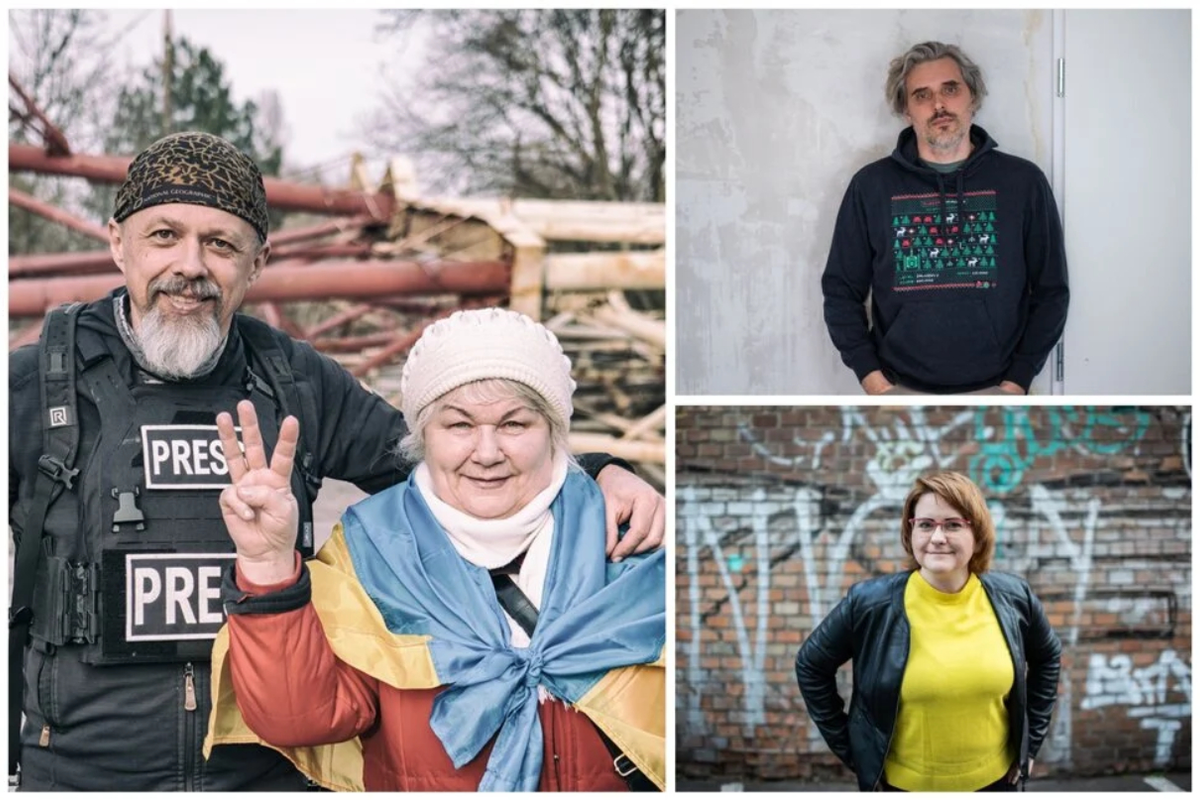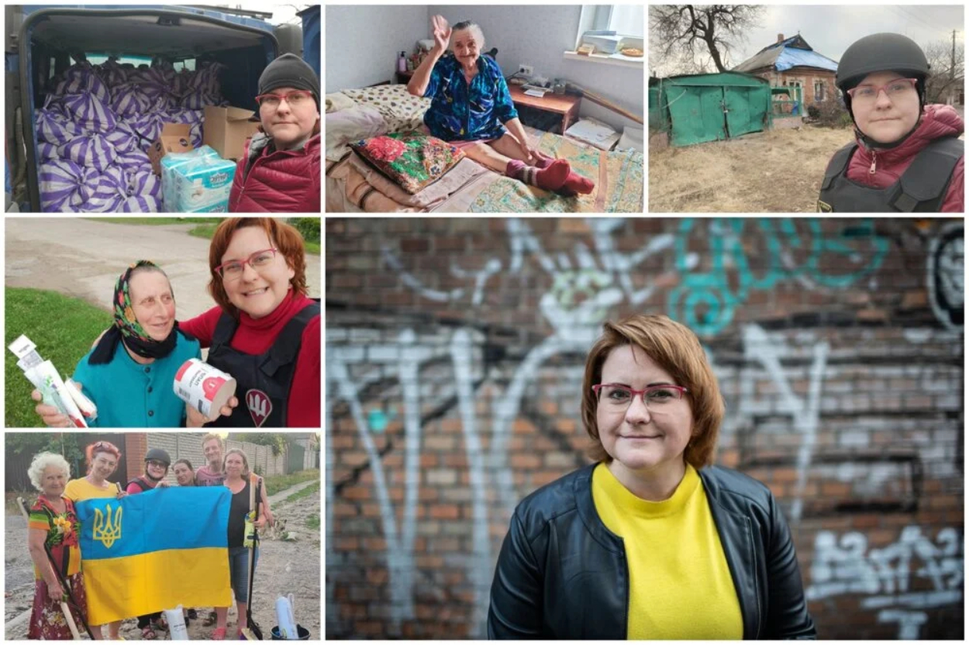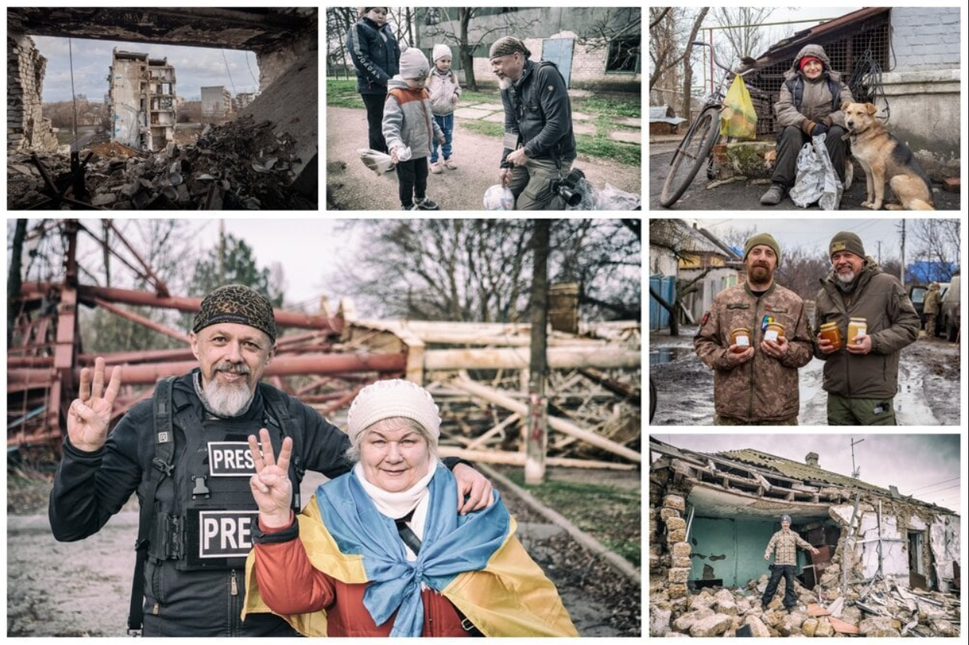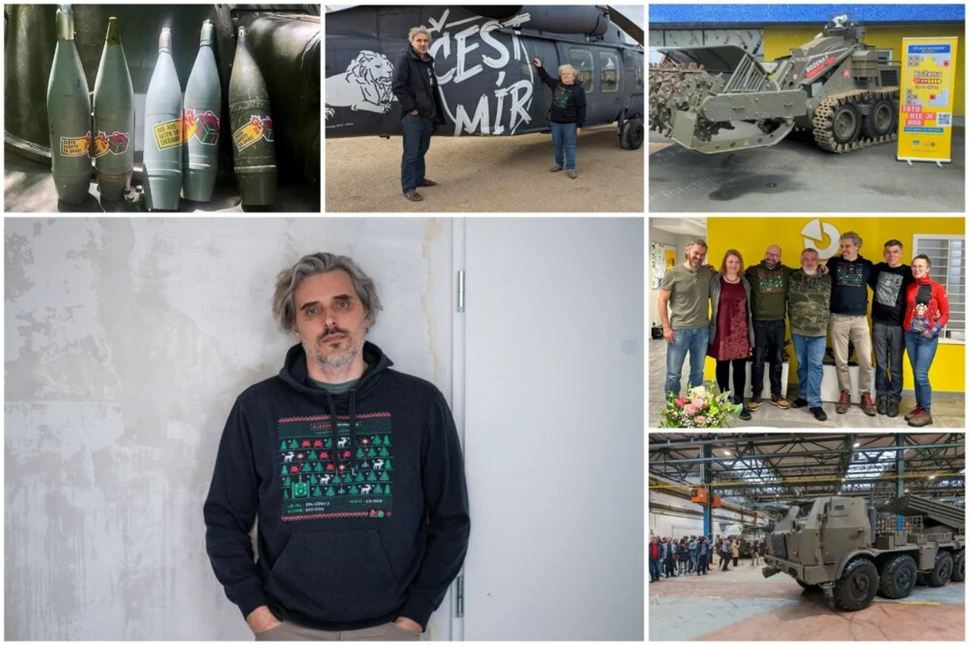Avoided even by large organisations, Eliška Horsáková is giving aid in those shelled areas where people are afraid to enter the forest to collect wood because of mines. Designer Dodo Dobrík thinks that only a quick delivery of weapons can end the war; he is involved in an initiative that sends "gifts" to Putin. The war forced blogger and entrepreneur Marcel Rebro out of Russia; what was originally a photographic trip to Ukraine has become a humanitarian mission.
Even though two years have passed since the the Russian invasion of Ukraine began, with public interest and the amount of aid decreasing, these three Slovaks have not given up on Ukraine. They are just a handful of otherwise hundreds of volunteers who send and transport humanitarian aid to Ukraine, as well as ammunition and medical equipment.
What is their motivation to help, what do they experience near the front line and why do they think it is important for Slovakia to stand behind Ukraine?
She goes where others won't
When the Kakhovka Reservoir exploded, she was trying to buy wheelbarrows all over Odessa for people in the flooded villages. She saw Russians using drones to drop mines on those who went to get water. She goes to villages where no other help usually comes.
"Sometimes I cry and I'm grateful to be alive. I'm having trouble understanding people who get angry over petty things. When someone gets lost somewhere and complains that they have to make a detour, I tell myself that at least they don't have to watch out for mines," Eliška Horsáková, a 34-year-old entrepreneur and volunteer, describes in an interview with the Sme daily.
When the invasion began, she first helped at the Slovak-Ukrainian border. "I knew the language, but I very quickly realised that those who cannot or do not have means to leave will suffer the most," she says.
She bought an old van for €300, called her friends to find out what people in the villages in eastern Ukraine needed most, loaded the van with humanitarian aid and drove there. "It would have been enough if the van had lasted one trip, I could have returned by train," she says. In the end, she drove 16,000 kilometres and eventually replaced the van with a newer one. Since then, she has been driving to Ukraine regularly, mostly to places that even the largest humanitarian organisations avoid.
Losing a boyfriend, understanding Ukraine
Horsáková has been going to Ukraine for 15 years - she started as a Salesian volunteer in camps for socially weaker children in Transcarpathia, western Ukraine, and eventually travelled to other regions as well. "I tried to spend as much time as possible with Ukrainians - to learn the language, to understand how the country works, its problems with corruption. In some things, for example, how people helped each other, Ukraine appealed to me more than Slovakia," she says.
Nevertheless, she felt that many people wanted their country to be Western-oriented and reach the level of Slovakia at least. That is also why in 2014 she went to Kyiv's Independence Square to protest for a better future alongside Ukrainians. She met 27-year-old Taras there. After a few months, when the separatist conflict broke out in the east of Ukraine, Taras sold his cafe and went to fight in Donbas. "He said that if they took Donbas from Ukraine, they would also take Kiev and then Lviv. It was hard to talk him out of it," she recalls.
Taras died in the summer of 2014 near the town of Debaltseve. At that time, Russian soldiers came to help the separatists and surrounded the Ukrainian soldiers in the "Ilovaisk kettle". Although the Russians agreed to allow Ukrainian soldiers to retreat, in the end the former attacked the latter. "We all expected that the worst was over, but he never returned home. We didn't expect that at all. That's when I understood that you cannot rely on agreements with Russians."
This loss did not damage Eliška Horsáková's relationship with Ukraine. "I needed to understand why Taras died and whether his struggle was meaningful, so I travelled around Donbas, Odessa, and Dnipro," she describes. She visited wartime Donbas with Ukrainian carollers so as not to attract attention.
In Slovakia, she deals with medical supplies; since the beginning of the invasion she has been buying the most necessary items for Ukrainians - candles, blankets, warm clothes and hygiene articles - using contributions from supporters. She buys food in Ukraine so that she doesn't have a problem with customs at the border. The journey to the Kherson or Kharkiv regions sometimes takes her three days.
"From mayors, policemen and soldiers I learn which people and which villages need help the most. I also try to explain to people that I'm alone, that I cannot help everyone and that I cannot deliver the materials to repair a roof. Many will understand and, for example, point me to people in greatest need," she says. She rarely stays in shelled areas - cities and villages are usually hit in the morning. "Even when I stayed overnight in Kherson, I almost always slept in a bathtub," she adds. Anti-aircraft defence cannot shoot down tank ammunition so effectively.
To avoid corruption, she is distributing aid directly to people. "I'm going to villages with maybe 50, 100 people left. I'm not a courier, but psychological support goes a long way. Because I speak Ukrainian and I'm a woman, many people trust me with things they wouldn't otherwise tell soldiers. When they see soldiers in the trenches, it seems petty to ask them for shaving supplies or sanitary pads. They can confide in me," describes Horsáková.
The lonely elderly in destroyed villages with no signal were happy when she brought them hand-drawn postcards from Slovak children. "They lack contact with the world, but when I tell them that some little girl from Slovakia is keeping her fingers crossed, they are touched," she adds.
I no longer say Glory to Ukraine
Since the start of the Russian invasion two years ago, the mood among Ukrainians has changed. She admits that Russian missiles have numbed many people living within range and that the situation on the front is not good. This stems from conversations with soldiers, who often warn her about dangerous areas. "In the beginning, they felt that they would drive Russians out within half a year and that Europe and America would quickly send them weapons. However, this did not happen: neither many weapons nor many achievements came about. It must be frustrating receiving 16 tanks a month when you know the Russians have one hundred," she describes.
Had most of the weapons arrived at the start of the war, according to Horsákova, the Ukrainian soldiers would have been able to drive the enemy out from their territory. Enthusiasm stemming from successes at the front also waned. "I prefer not to greet them by saying 'Glory to Ukraine' any more, it disturbs some."
The situation of displaced people is also worsening. "There is less aid and Ukraine does not have the economic capacity to help everyone. In the beginning, buses and accommodation for the displaced were free, but today people have to pay and food is getting more expensive. "Many are frustrated, and some people near the front are surviving only because their neighbours still have canned food at home," she says. Horsákova has also provided some people with accommodation in Slovakia to allow them to mentally relax from the war for at least two weeks, and then she takes them back home.
In Ukraine, diminishing aid from abroad can be felt too. "Currently, it's still cold, so there is a demand for warm things and shoes. When I brought them in boxes, people also wanted the latter so that they would have something to warm up. There are forests around them, but they don't go there because they are full of mines," she describes. Russians are dropping small anti-personnel mines on fields and forests.
Despite willing donors, Horsáková sees that Slovaks are less and less willing to help. "Everyone should experience a day in a war to realize that it's much closer than it seems, to see what it's like to fight a nuclear power. It's a blessing that we are not neighbouring Russia," she says.
According to her, if Ukraine fails and loses its territories, it will be a testament of Europe's failure and its security. "People say it's not our war. But it's not North Korea or Thailand, it's a neighbouring country that is much closer to us than to Russia and that wants things to work there at least as well as here," she adds.
Drones help the most
If Ukraine falls, we will have Russians at our doorstep. And I don't want Russians at our border, says entrepreneur and blogger Marcel Rebro. He regularly travels to Ukraine, blogs on the Sme.sk website, and organises collections for medical supplies, cars, and drones for the Ukrainian armed forces.
"Not long ago, I was in a sanatorium in Odessa. They have a major problem with people who have lost their sight. There are people who have serious psychological problems, post-traumatic stress disorder, brain contusions. Some get panic attacks," he says.
Humanitarian aid for civilians is working well in Ukraine, he claims. The problem is the long-term consequences of the war - tens of thousands of people with physical and mental traumas who have to integrate into society. Mothers who lost their husbands live in rented apartments and their lives are governed by the deadlines for the delivery of humanitarian aid. On Tuesdays it's Red Cross, on Thursdays charity.
The army needs significant material aid. While individuals and civic organizations cannot supply howitzers or 100,000 artillery shells, there are things that even enthusiasts like Marcel Rebro can acquire and deliver.
In the tundra with no signal
"I was in a difficult situation because I had, actually still have, an ongoing project in the north of Russia," says Rebro. The news of the Russian invasion of Ukraine found him in the tundra among the Nenets - a nomadic people who still live in yurts and ride reindeer. As a citizen of Slovakia, an enemy state, he could no longer return to Russia, so instead of documenting the life of the Nenets, he and a friend chose to document the war in Ukraine.
"We had contacts in Ukraine and among soldiers. When we told them we were coming, they started asking if we could bring them something. That's how a photo mission became a charity one," says Rebro. "A friend lent me a van and we went. We had no idea how humanitarian aid is carried out," he recalls.
One of the most important things they brought to Ukraine were tourniquets.
When he met Iryna Lazarova in Odessa, who supplied the soldiers near Bakhmut, and handed her a box of tourniquets, she cried. "100 tourniquets for €45. It didn't seem like a big deal to me," says Marcel Rebro. "She told me that every one of those things potentially means one saved life. If you didn't save 100 people, then maybe 30, maybe 'only' 10. I knew then that even if I didn't bring home a single photo, it all mattered." he talks about his experience.
Angry, tired
After two years of war, fatigue is visible among Ukrainians themselves, but determination, strengthened by anger at the invaders, is growing stronger.
"The Russians are trying to break them, but the effect is the opposite. Those people are incredibly angry. They are tired, brutally tired, but they are pissed. So much so that they have to hide Russian prisoners of war. Grandmothers would beat them with brooms," Rebro says about his experiences in Ukraine. According to him, Ukrainians know that they cannot stop because the Russians will not stop. That is why Rebro refuses to stop himself. He does not want to fight against the Russian invasion army at the Slovak border one day.
When it comes to aiding Ukraine, if an ordinary Slovak can choose what to support, it is clearly drones. An observational one or those that can deliver an "eggplant" to the enemy, which is local slang for a mortar shell. They are a relatively cheap and effective means against the enemy who has thrown all its resources into the war.
Ukrainians can respond to artillery fire with drones, but first they have to see the targets. For that, they need surveillance drones - with thermal cameras, wide and telephoto lenses. A drone worth €400 can carry an 800-gram mortar shell over to the enemy and hit them. However, the Russians have already learned this method, also well documented in videos.
Enemy drones must be fought against, as well as using drones equipped for radio-electronic warfare (REB), which can disrupt enemy radio or take control of their drones.
When Rebro organised a Christmas gift campaign for Putin's heroes on the Donio platform, he raised money for drones to deliver fresh eggplants to Russian soldiers. When he then ordered the drones and told the distributor that they would go to Ukraine, he immediately received a discount.
"We were surprised that people are still sending money and are still angry. They can still be agitated," he comments on the attitude of people in Slovakia.
No way to win without weapons. That's why they send unpleasant gifts to Putin
On the day Russian President Vladimir Putin was celebrating his birthday, Czech Defence Minister Jana Černochová posted a photo on X (formerly Twitter) in which she was wearing a t-shirt depicting a skeleton giving a raised middle finger and the words "Fuck you Putin".
Designer Dodo Dobrík was behind the idea, who was angered by images from the destroyed city of Bucha near Kyiv, where Russian soldiers killed hundreds of civilians. "I saw a photo with a dead hand in Bucha. I decided to pick it up and show Putin the middle finger with it and prove that even if that person is dead, they are invincible," he says.
At the time he had already been involved in the Czech initiative "Dárek pro Putina" (Gift for Putin). Almost from the beginning of the war, it had bigger ambitions than many other collections - not only to collect aid for soldiers or ammunition, but also to buy a tank or a helicopter. Today, it has successfully collected more than €26 million, especially in the Czech Republic, mostly for weapons and equipment. "From the beginning, we wanted to do big and distinctive things. Even abroad, no one had made such a large collection, but we wanted to try it," says Dobrík.
At the beginning, he also had to think about his moral boundaries and how correct it was to send aid in the form of weapons or ammunition. "However, we argued that the war cannot be won without weapons. If anyone says that guns prolong a war, that's just a sweet lie. A stronger Ukraine and its army can stop the aggressor, so if there had been more weapons at the beginning and immediately, maybe the aggression would have resulted in fewer deaths. Weapons help these men defend their families," he says.
Online shop selling tanks
Dobrík's frustration with how to help the Ukrainian army defend itself in the first weeks led him to join the initiative. This is how Gift for Putin was created - a project that, among other things, transparently shows how much war costs and thanks to which even ordinary people can contribute directly to the purchase of military equipment. "It was a sort of an online shop. At the beginning, we said to ourselves that we will help until the end of the war and that we don't want to add scary stories and depression to it," he says.
Both the unconventional method and the marketing have aroused great interest from abroad. In the first year, for example, in cooperation with the Czech Defence Ministry, they collected more than €1.3 million for a tank named Tomáš (Thomas), used by the Ukrainian army in the battles near Bachmut. More than 11,000 people contributed.
Since then, supporters have also joined in on anti-aircraft defence, rocket launchers and drones. They coordinate the purchase of equipment with the Ukrainian side and according to what is available on the market. For example, they have currently started a collection to buy 10 tonnes of plastic explosives that the Ukrainian army can drop from drones. In a few months, it might no longer be on the market.
When it comes to importing military equipment, they cooperate with the Czech army, as the transfers are subject to secrecy. Their collections were openly supported not only by the Czech Defence Minister, but also by President Petr Pavel.
During the last summer, they collected more than €650,000 from Slovaks, Czechs and, thanks to a donation from Taiwan, the Božena 5 demining device was bought. In autumn, the initiative also launched the Slovak version of Gift for Putin, in cooperation with the Peace in Ukraine project.
Nevertheless, Dobrík claims that campaign communication in Slovakia and the Czech Republic is different. "Slovaks take themselves much more seriously. From the beginning, we didn't want it to be a depressing and pathetic initiative, which is why it uses playful colours. In the Czech Republic, they understood this kind of humour," says the designer. When they conducted a poll on which colour they should deliver the device, pink won in the Czech Republic. In Slovakia, the initiative received hateful comments and criticism that they belittled the army and that it was a sign of disrespect.
The device will not be used by soldiers, but by volunteer firefighters to clean civilian areas. The production of the device is currently being completed.
The current collection for a helicopter named Čestmír is in a similar position. It mocks people nicknamed "chcimír" (meaning "I want peace"), i.e. people who are calling on Ukraine to give up its territory for peace.
It's also our war
Even though Dobrík himself has not been in Ukraine since the beginning of the invasion, the initiative has an overview of the delivered weapons, ammunition and aid. "At the very beginning, we sent ammunition to the front. I was just travelling by bus when we received a photo from Ukrainian soldiers who told us that they had used our missiles in the morning, and that they were grateful that someone was thinking of them," he says. At that time, Western weapons were still slowly reaching Ukraine. "These soldiers didn't know if it would turn out like in 2014 and whether everyone would turn their backs on them. That's when they understood that someone wanted to help them," he says.
However, they also received bad news. "We received word that the unit to which we had been sending food and equipment were all dead as their positions had been bombed."
Today, Gift for Putin functions as a platform for smaller collections as well. "Even if you want to raise 100 million crowns for a helicopter, it can help other collections. People will say to themselves that it's stupid to pay so much money, but they prefer to support a smaller cause," says Dobrík. Money for a van to take away the wounded was collected within 24 hours, significantly faster than other initiatives.
According to Dobrík, a strong community of people in the Czech Republic and Slovakia has formed around the initiative, who persistently continue to support Ukraine despite declining interest. Selling t-shirts and sweatshirts with ironic references to Putin's invasion also helps.
Meanwhile, Ukraine is already struggling with a shortage of ammunition and the slow supply of weapons. Even if one tank or a couple of drones do not move the front line, according to Dobrík, it is important to do everything to support Ukraine. "I don't want to imagine a scenario in which Ukraine loses. It's enough that I see how in Slovakia we are absolutely losing the information war," he says. "The way I see it we are not only helping Ukraine, we are helping ourselves as well. We can be very thankful that the battlefield, the front line, is not here. It's also our war, not only a Ukrainian-Russian one," he adds.
©Sme





